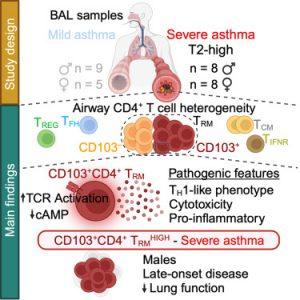In a recent study, research has brought to light a new subset of immune cells believed to fuel severe asthma, primarily affecting men who develop this condition later in life (Figure 1). The research highlights that men encountering asthma after the age of 40 often host these T cells in their lungs, potentially contributing to hard-to-treat and life-threatening asthma attacks.
Identified as ‘cytotoxic CD4+ tissue-resident memory T cells,’ these immune cells have evaded conventional therapies aimed at mitigating immune responses, posing a significant challenge in asthma treatment. Extensive longitudinal studies involving diverse asthma patients across age groups, genders, and disease severities unveiled a strong correlation between asthma symptoms and the activity of these immune cells.
These specialized T cells, known as ‘memory’ cells, typically safeguard the body against previously encountered pathogens. However, in individuals with asthma, these cells misinterpret harmless substances like pollen, triggering an aggressive and hazardous inflammatory reaction in the lungs, worsening asthma symptoms.
For men developing asthma later in life, an alarming prevalence of these potentially detrimental T cells was observed. Unlike the usual diverse CD4+ T cell population found in the lungs, this group exhibited an overwhelmingly high proportion—more than 65 percent—of cytotoxic CD4+ tissue-resident memory T cells.
The study introduces a critical advancement: the use of single-cell RNA sequencing as a ‘biomarker’ for detecting cytotoxic CD4+ tissue-resident memory T cells. This technique promises enhanced detection and monitoring of these specific immune cells in a larger pool of asthma patients, potentially guiding more targeted and effective treatment approaches.
This discovery provides a significant leap in understanding the immunological intricacies of asthma, especially in men developing this condition later in life. Further exploration into the role of these T cells may unlock innovative therapeutic strategies, offering hope for improved asthma management and personalized treatment interventions.
Journal article: Herrera-De La Mata, S., et al., 2023. Cytotoxic CD4+ tissue-resident memory T cells are associated with asthma severity. Med.
Summary by Stefan Botha











